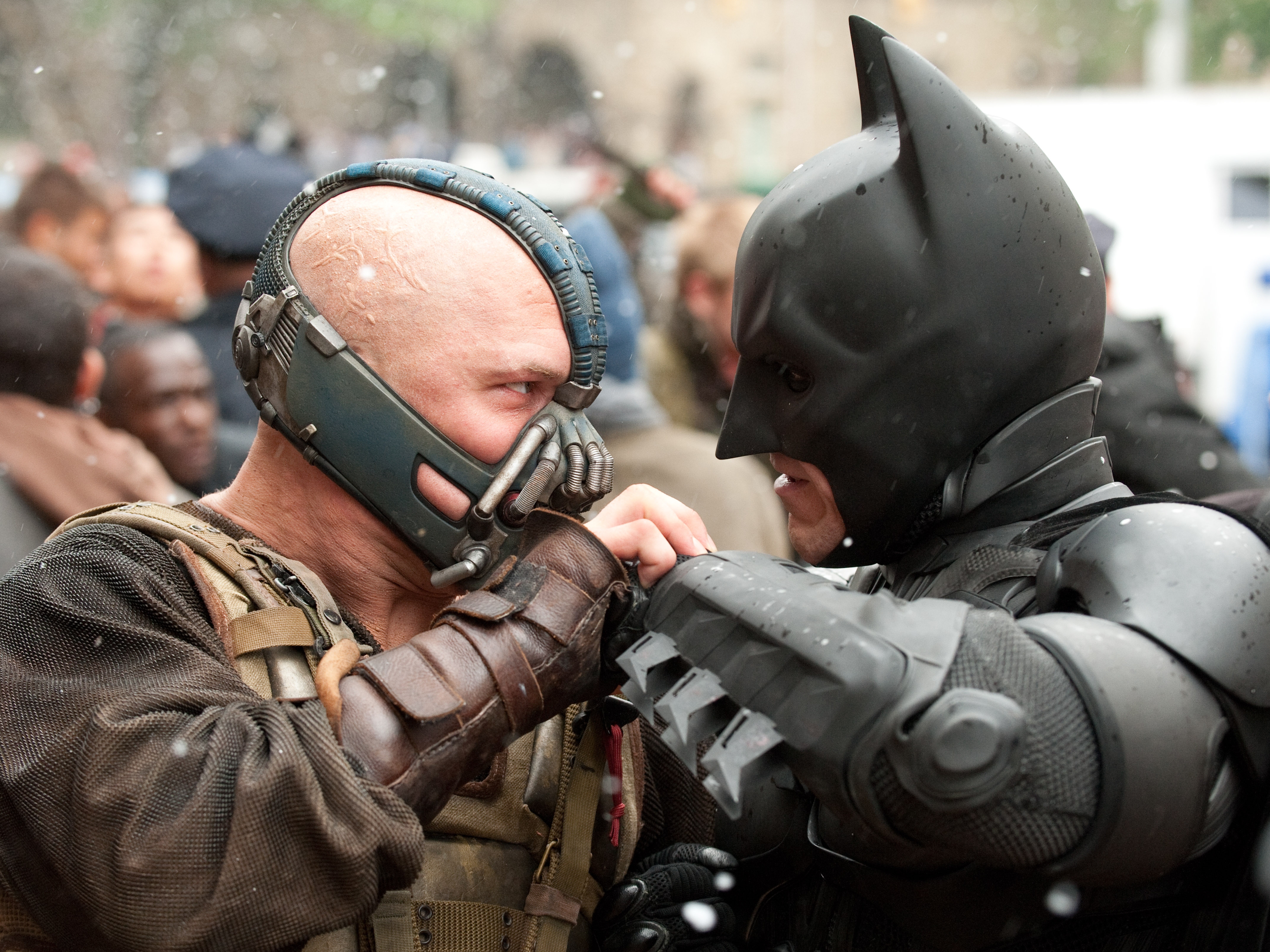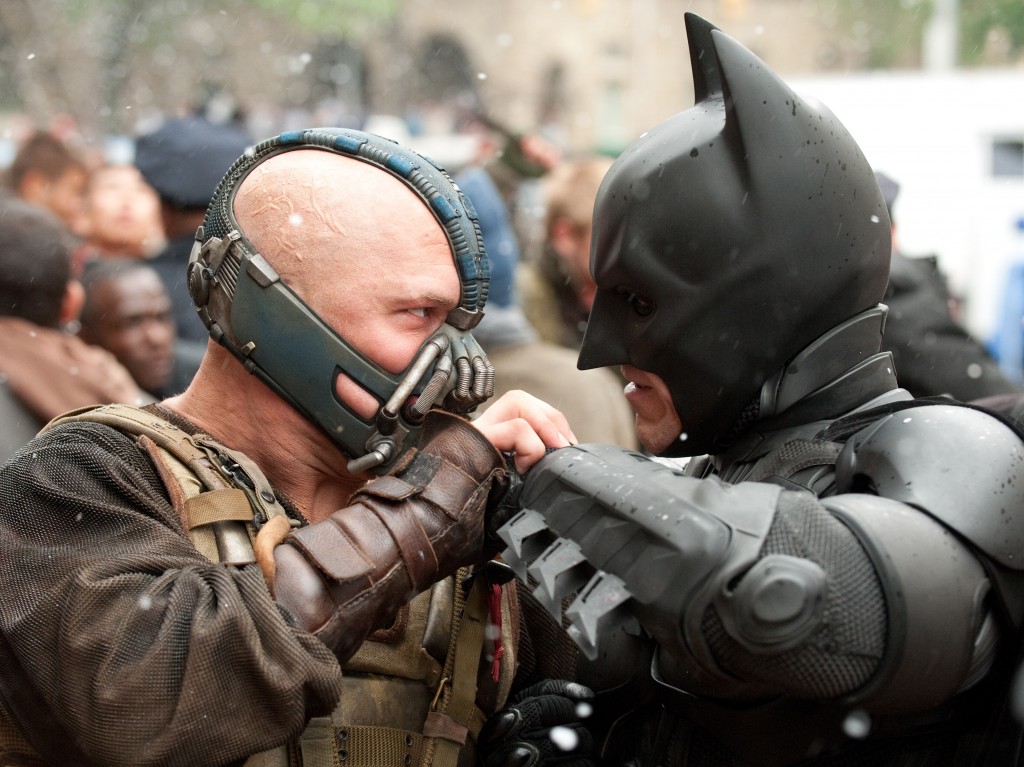This is a bittersweet day for Batman fans. On one hand, the release of The Dark Knight Rises—what must be one of the most anticipated events in movie history—is finally here; on the other hand, this marks the end of a Batman franchise reimagined with more skill and passion than any comic book movie before it. Batman Begins redefined the standard for the superhero genre. The Dark Knight elevated it close to cinematic perfection. Now The Dark Knight Rises hits theaters, putting an end to Christopher Nolan’s thus far genius saga.
The final installment picks up eight years after The Dark Knight, when Batman took the heat for crimes he did not commit to protect Gotham’s hope and the memory of his friend Harvey Dent. The caped crusader has not been seen since then. Bruce Wayne has been living in seclusion, his public appearances limited to the point he’s developed a reputation as a Hughesian recluse. And it probably would have stayed that way had trouble not come to his doorstep.
After a series of events an ordinary man would deem unrelated, the world’s greatest detective begins to string the clues together until he reaches the conclusion that there’s big trouble in Gotham once again—big enough that it warrants the Batman’s return.
Enter Bane, known throughout the comic world as one of Batman’s greatest foes—the man who broke the Bat. Intelligent as he is powerful, Bane has proven to be the only person who can match Batman in both brains and braun. His filmic counterpart, played by the ever-brilliant Tom Hardy, is no different. Throw in Catwoman and some other insidious forces, and Batman is faced with his greatest challenge yet.
As such, TDKR does a lot to up the ante, and it succeeds on many fronts.
Tom Hardy’s Bane proves to be a fearsome enemy, a result not only of physical size but of merciless execution. Hardy’s work is all the more impressive considering the emotion-masking breathing piece he wears throughout the movie, though one does notice its stunting effect. Bale is solid again as Bruce/Batman, his growl as menacing as ever. And Anne Hathaway gives perhaps the best performance as the duplicitous Selina Kyle/Catwoman, jumping between a few personas to best suit her own needs.
Nolan again touches on the concept of fear, giving a nice bookend to a series that began examining the subject from the very beginning of movie one. There’s some further nuance added to Bruce/Batman’s relationship with his fear, culminating in one of the film’s more dramatic moments.
However, as painful as it is to write, there’s something lacking in TDKR. The story’s stakes, while higher than films past, never seem to transcend the personal stakes setup in The Dark Knight. Yes, the city may be in total disarray, on the brink of annihilation even, but that’s not necessarily new, and Bruce/Batman never has anything to lose other than his life, which he doesn’t care about anyway. That’s not to say that TDKR is without strong conflict, only that it never reaches the psychological complexity of The Dark Knight, when Bruce/Batman was forced to not only question his personal life decisions but also his extreme moral code. The man was not at risk of losing his life in The Dark Knight so much as his soul. It’s no surprise, though; the struggle could not be as intense in part three, considering the Joker’s place in the Batman mythos. Bane could never elicit the response that the Joker could. That’s a fact of the history.
Another problem is a lack of Batman himself. Aside from the all-out grand finale Batman gets very little screen time, and that’s troublesome for a few reasons. One is that Batman equals action. Two (and this will be touched on in-depth later in the article) is that Batman is the focus of this story, the center of everything. Our protagonist is not Bruce Wayne; it is Batman. To put it another way (as Dan Di Dio, Senior V.P./Executive Editor at DC Comics, does in the History Channel doc Batman Unmasked), “The reality is that the batman persona is the true persona—in our opinion, the way we handle the stories—and that Bruce Wayne is the mask.” Even in the Nolan version, this idea is touched upon. As Rachel Dawes says in Batman Begins, referencing Bruce Wayne’s face, “No, this is your mask. Your real face is the one that criminals now fear.” Yes, Bruce Wayne in much of the movie is acting in private or among his partners, so the Bat persona is still present. However, he is only ever pure when he is in the cape and cowl. This lack is even more problematic at film’s end.
Again, it is important to stress that this entry into the Batman universe is by no means a failure. Nolan again shoots with great attention to the craft; the action is fast-paced and often a massive spectacle (the first plane scene in particular); and the story offers a couple moments of genuine catharsis. And of course, it is at root another Batman movie, which is always a pleasure. However, it does not reach the heights of The Dark Knight. TDKR is what Return of the Jedi was to the Star Wars trilogy (though much better a movie). We’re given moments of brilliance. We’re given heroism and badassery. We’re given a moving climax. But The Dark Knight, like The Empire Strikes Back, will always be the better entry. Evil is personified; darkness runs rampant; and uncertainty abounds in the wake of Batman’s unthinkable failures. He could not save Harvey Dent. He could not save the love of his life. Yet in spite of everything there is hope.
SPOILERS BELOW
The film’s ending is where things really get muddled for the Batman fan, as we’re left with the knowledge that Bruce, having seemingly died in a nuclear explosion as he saved Gotham, has rid himself of the Batman persona and, as Alfred witnesses, is living out his days with Selina Kyle. It presents an internal conflict. In a way we’re glad to see Bruce Wayne ridding himself of the need for vengeance. We’re glad to see a happy end for a man who has given so much for his city and the world. And yet, is this a realistic ending? In a series prized for its grittiness and reality (a superhero that could actually exist) the most implausible piece is the idea that Bruce could ever give up being Batman. As expressed earlier, Bruce Wayne is the mask: an arrogant, lazy playboy who cares only for his own satisfaction. Batman is the reality. And while Bruce can move on after his faked death and merge the personas under the Bruce Wayne mantle, it does raise questions.
Can a man whose obsession with vengeance—and this is often argued almost as a form of mental illness on par with the Scarecrow’s fear obsession, the Joker’s chaos obsession, Two-Faces duality obsession, etc.—is so overwhelming that it leads to a rebirth as a tireless bat-garbed vigilante ever truly live a normal life? How long until the Bat rears its head? For surely this is a question of when rather than if. Maybe it’s ten, 20, 30 years down the line, but it will happen. Bruce will be in France or something, eating crêpes with Selina and his kids, when he sees a little old lady getting mugged by a Parisian hoodlum. How can we believe the greatest hero the world has ever known could let any injustice—even the smallest transgression—go unchecked. As much as we want Bruce to move on from his parents’ death and be happy, it can never be so.
The argument could be raised that Bruce has left the crime fighting to John Blake (Joseph Gordon-Levitt) whose real name, in somewhat of a dumb slow roll, is revealed to be Robin. This is a tad ridiculous because Bruce knows only that Blake has a similar disposition as him. He doesn’t know if Blake has the same code as far as killing goes, or the same strength and endurance in the face of adversity, or the same intelligence. Only that Blake was an orphan like him and believes in Batman when nobody else does. He also got pissed at the last guys who tried to copy his style in The Dark Knight. So that’s odd.
But while Bruce’s passing of the torch is both silly and does not excuse the fact that he would never give up the fight completely, it does allow for two possibilities: a continuation of the series with a new Batman or Robin or Nightwing or whatever (why else introduce the character/place him in the Batcave at the film’s end) or perhaps a The Dark Knight Returns adaptation years down the line. That’s pure and wild speculation, and Nolan has stated TDKR will be his last Batman picture, but imagine how incredible that would be. Christian Bale once said “If Robin crops up in one of the new Batman films, I’ll be chaining myself up somewhere and refusing to go to work.” And yet here we are. Just saying.


this movie slobbered all over my taint.
And spiderman too. Jesus Christ, America.